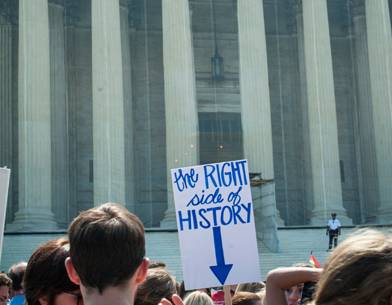
The Hobby Lobby Ruling: What the Court Said
Blog Search
Today, in a 5 to 4 decision, a majority of the United States Supreme Court held that family-owned businesses can refuse, based on their owners’ religious beliefs that their employees might not share, to pay for insurance coverage for contraception despite the requirements of the Affordable Care Act (ACA).
Justice Alito’s opinion for the Court, which was joined by Chief Justice Roberts and Justices Scalia, Kennedy and Thomas, is long and detailed, and time will tell which of those details turn out to be most important. But the Court definitely broke new ground, as Justice Ginsberg explained in an emphatic dissenting opinion joined by Justice Sotomayor. Justices Breyer and Kagan joined that dissent in part and filed a separate dissent explaining serious concerns. Jenny Pizer will be writing later about the implications of the Court’s decision for LGBT people, especially Justice Kennedy’s concurring opinion stressing that the Court today is not approving religious exemptions to nondiscrimination laws. And there will be a lot more exhaustive analysis to come in time. Here, for now, is a short summary of some of the key points.
Under the ACA, employers with more than 50 employees must provide health insurance coverage that includes various types of preventive care at no cost to the employee (or other covered family members). Federal regulations require that these plans include all of the methods of women’s contraception approved by the Food & Drug Administration. The owners of the companies in the cases decided today have religious objections to four of those methods of contraception, and insist that their beliefs should permit them to exclude those methods from the health insurance provided to company employees.
Affordable Care Act at the Supreme Court: Religious Exemptions
In today’s decision, the Court held – for the first time ever – that at least some for-profit corporations have religious rights. The Court explained that the companies in these cases are owned by family members who share the same religious beliefs about contraception. The companies do not have shareholders, and are not publicly traded. The Court said it was “unlikely” that large shareholder-owned companies would try to assert such rights, but its decision today nonetheless was groundbreaking. Although non-profit religious corporations have been recognized as exercising religion because they are associations of persons assembled to pursue religious purposes, before today, the Court had never said that any for-profit companies could exercise religion.
Because the Court held that these companies have religious rights protected by the Religious Freedom Restoration Act (RFRA), a federal law, the Court considered the companies’ objections under that law’s test. Under RFRA, a government regulation that imposes a substantial burden on a person’s exercise of religion has to be narrowly tailored to serve a compelling interest.
With negligible analysis, the Court majority agreed with the companies that the ACA’s contraception requirement imposes a substantial burden on the owners’ religious rights. The owners had claimed, and the government did not dispute, that they sincerely believe their exercise of religion will be burdened. Although the owners were unlikely to know who among their employees made what choices concerning birth control, the Court stressed that noncompliance with the regulation could result in financial penalties of $2,000 per employee per year. In doing so, the Court rejected the government’s argument that the employer’s role – paying for the insurance plan – is too far removed from the employees’ decisions about using contraception to be a substantial burden.
Finally, the Court assumed that the regulation advanced a compelling interest – specifically, in guaranteeing access to health care that includes these four contraception methods. But the Court nevertheless decided that the companies do not have to comply because, in the Court’s view, the government could further that interest in a less restrictive way. The Court based this conclusion on the fact that the government already has in place a process permitting other employers – specifically, non-profit religious corporations like churches, religious schools, and similar entities – to object to paying for contraception and ensuring employee access paid for another way. The Court then decided that the government can use this same approach for these for-profit employers, too.
Today’s ruling concerns the ACA and women’s reproductive health and rights, and the Court was explicit that there might be a different result where an employer has religious objections to other types of health care, such as vaccinations or blood transfusion. And, essential to Lambda Legal’s mission, the Court expressly rejected the idea that employers can violate other employment discrimination rules, using race as an example, because of their religious beliefs. The Court drew a clear distinction between the gender-equality contraception mandate and other kinds of nondiscrimination protections. The majority recognized that there’s no more limited way to achieve the government’s compelling interest in ending invidious discrimination than to prohibit employers and others from discriminating.
Today’s decision answered the question before it, but as recognized both in Justice Kennedy’s concurrence and Justice Ginsburg’s strongly worded dissent, this likely will increase, rather than reduce, the volume of clashes in which business owners seek, in the name of religious exercise, to claim exemptions from other workplace laws and regulations. It is, therefore, vital for those of us working for equality in the workplace to continue to press for protections that are explicit, strong, and unequivocal.




